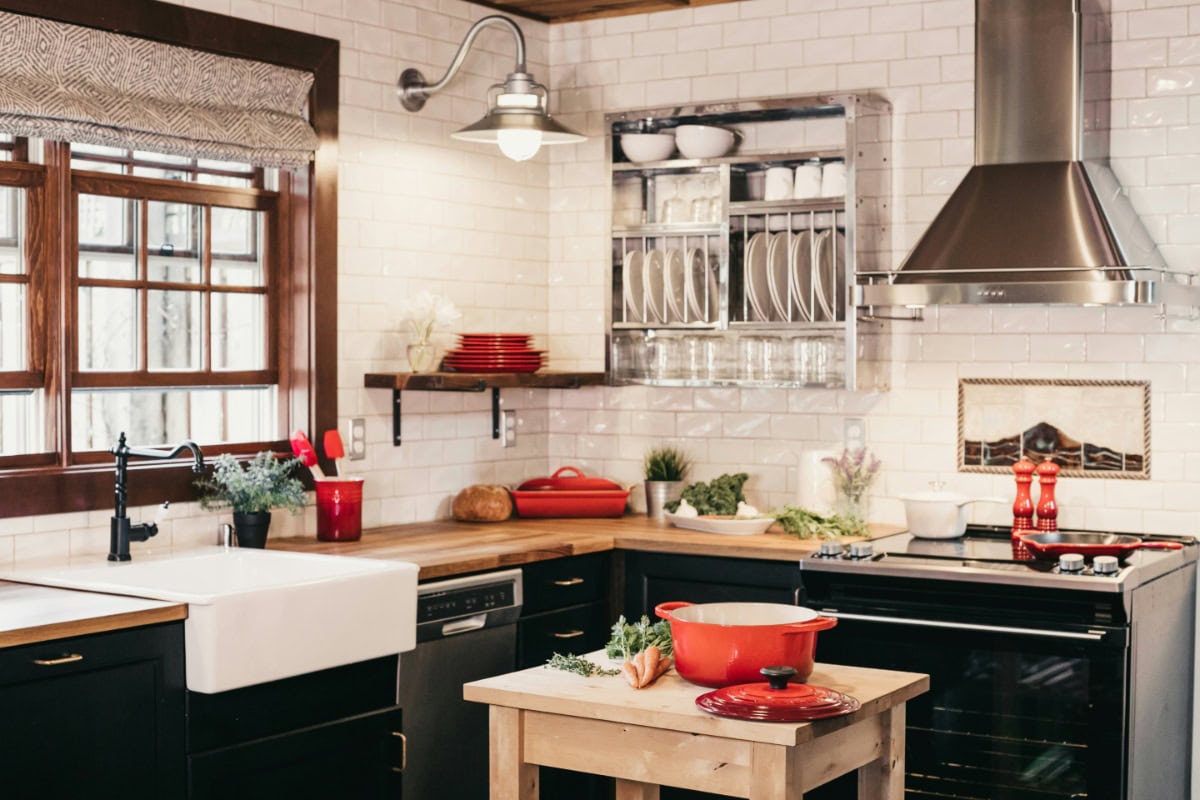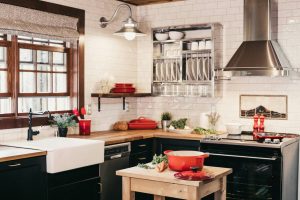
A well-prepared kitchen is the key to unlocking your cooking potential. As an experienced chef or beginner, the way your kitchen is set up can make a world of difference in your cooking process. As Mary Kathryn Reese of Kitchen Design Concepts says, “Functionality is the most important part of a kitchen for home cooks. Every home cook has a different approach and because of that, I truly believe every home cook’s needs are different for their kitchen!”
From organizing your tools and ingredients to optimizing the use of space, the right kitchen setup can save you time, reduce stress, and inspire your creativity. While there are many recommendations do not feel overwhelmed. Instead, keep it simple and listen to Lauren of Tastes Better From Scratch when she says, “A kitchen doesn’t need to be fancy to be perfect for home cooks — it just needs to be practical and inviting. I love having prep space close to the stove to make cooking easier, and a few quality tools, like a good chef’s knife and a cast iron skillet, can really make a difference. Plus, keeping tried-and-true from-scratch recipes in your rotation — like homemade soups, sauces, or dressings — can make the cooking feel even more fun and rewarding!”
Whether you’re looking to optimize your kitchen in an apartment in Seattle, a new home in Chicago, or a rental home in New Orleans, this Redfin article will explore essential tips for preparing your kitchen for home cooking — helping you create a space that’s not only functional but also enjoyable to work in.
Efficient storage: A key to stress-free cooking at home
Effective kitchen storage is the foundation of any successful home cooking experience. Having a well-organized space to store your ingredients, tools, and cookware makes meal prep smoother, quicker, and more enjoyable. As Chef’s Vision Knives states, “An ideal home kitchen balances efficiency and creativity. Thoughtful organization — such as labeled storage containers, drawer dividers, and open shelving — helps home cooks keep ingredients and utensils within reach. A kitchen with flexible storage solutions, like pull-out pantry shelves or stackable containers, makes it easier to maintain a clutter-free space, enabling smoother cooking experiences.”
Martin from Dad What Cooks writes, “Having recently downsized my kitchen when I moved house, I looked to identify exactly what was important for cooking at home. The biggest issue I faced was storage and I had to rework how I stowed all my bread-making and cooking ingredients. I decided to purchase an additional island to give me additional storage and a worktop which really helped.”
Furthermore, I’ve made use of the understairs cupboard space by converting it into a pantry/larder and adding shelves on the side. I have also used the back of the door as a spice rack to keep things organized. Additionally, I made sure that jars and tins were labeled which also made finding ingredients much faster when cooking.”
Kevin Gibbons of The Savvy Life adds, “Space is always a premium in a kitchen. Favor multi-purpose tools over single-function tools and keep what you regularly use in easy reach while storing those less common items. Take the time to measure and prepare ingredients in a clean, clear space before you start cooking. A little organization at the start will pay off in the end. Invest in a good set of nesting storage containers, preferably with common lids. Storing and searching for matching containers and lids is one of the biggest space and time wasters.”
Organize and optimize: Making the most of your kitchen space
No matter the size of your kitchen, making the most of your available space is key to staying organized and efficient. In compact city apartments or spacious suburban kitchens, every inch counts. As Chahinez of Simple Copycat Recipes says, “In my experience, a truly functional and inspiring kitchen starts with smart organization. Designate specific zones for prep, cooking, and cleanup to create a smooth workflow.”
Debbie Miller of Social Hospitality adds, “An ideal home kitchen should have a lot of space to maneuver. When I bought a new condo last year, I transformed the small, enclosed kitchen into a larger open concept. This makes cooking much more manageable, with ample counter space and an efficient layout. The functional design with lots of lighting, easy-to-clean surfaces, and a logical flow between prep, cooking, and cleaning areas ensures a seamless cooking experience.” Organization is required to maximize your space, especially for smaller spaces.
Ian Northeast of Dad’s Delicious Dinners states, “A well-designed kitchen is a home cook’s best friend. Think about it: a space that’s both functional and inviting can make all the difference in your culinary adventures. A triangular layout between your stove, sink, and fridge is a classic for a reason. It keeps everything within easy reach, so you’re not running around like a headless chicken.”
Personal Chef Maika Frederic details her advice for staying organized:
“When working in a small kitchen, organization is everything, especially when it comes to your prep area. Ideally, you want your cutting board to be placed between the sink and stove for a smooth workflow. This setup allows you to chop, wash, and transfer ingredients efficiently without having to move back and forth across the kitchen.
To maximize counter space, a sink rack can be very helpful. It gives you extra room for drying dishes or holding ingredients while keeping the counter clear. Multipurpose kitchen appliances, like a KitchenAid mixer with multiple attachments, can also help save space by eliminating the need for extra gadgets. The same goes for an air fryer or a small food processor—they’re compact but versatile, making them perfect for small prep areas.
Another space-saver? A small hanging kitchen garbage that clips onto a drawer. It’s a convenient way to keep your space tidy without taking up floor or counter space. In a small kitchen, efficient workflow is key. Having everything you need within reach can make even the smallest kitchen feel more functional.”

Essential kitchen tools for home cooks: Equip yourself for success
Having the right equipment in your kitchen is like having the right set of instruments for a musician — each tool plays a role in helping you create your masterpiece. The right kitchen tools can make a world of difference, from basic essentials to more specialized items each serving its purpose.
As Charlie DeSando of Cooking Secrets for Men states, “Most home chefs don’t need a high-end kitchen; they need a functional one. You need good knives and please store them in a knife block, not in a kitchen drawer. Cooking utensils should be on the counter next to the stove, next to the knife block, for easy access I prefer plastic or wooden utensils. They don’t scrape and damage nonstick pans. A couple of cutting boards and a full set of measuring spoons or cups. The things you use every day should be close at hand.”
Moving on to pots and pans, Emily Oldani of Namaste Home Cooking says, “The most important tools in any home kitchen are your pots and pans. Invest in a few high-quality options in different sizes, and be sure you have easily accessible cabinet space to store them. Nothing is worse than struggling to pull your favorite pan out of the back of the cabinet every other day. To save space, you don’t necessarily need every size or style; instead, consider how much and what types of food you cook most often, and ensure your pots and pans are suitable for this. A sturdy enameled cast iron braiser or a large cast iron skillet are my go-to options, as they transition easily from stovetop.”
COSORI states, “Every home cook should have quality, multifunctional appliances that not only maximize kitchen efficiency but also simplify meal prep and reduce clutter, making cooking more enjoyable and accessible. For instance, the COSORI TurboBlaze Air Fryer has five fan speeds and nine cooking presets, so it does much more than air fry. It can be used to bake, broil, proof, reheat, and more, giving home chefs the opportunity to explore new recipes and cooking techniques.”
Innichka Chef suggests, “From personal experience, I can say that cooking on an electric stove for just two weeks was enough for me. Gas stoves provide better control over the heat, which I find essential for achieving the best results.
Also, a big, sharp chef knife might seem intimidating, but it’s actually safer. The key is to keep it sharp — dull knives are much more dangerous!”
For inspiration and higher levels of food making, invest in quality ingredients. Miguel B of Le Gourmet Central notes, “The cornerstone of an ideal kitchen for home chefs is a well-stocked pantry. Focus on curating a selection of high-quality staples, such as premium extra virgin olive oil or artisan French butter being must-haves for their versatility and flavor. Stock up on a variety of condiments and spices for everyday cooking, and don’t forget to include some gourmet or exclusive ingredients that can elevate your dishes when hosting. A thoughtfully stocked pantry not only simplifies daily meal preparation but also empowers you to create impressive, restaurant-quality meals.”
Bobbi Jo of Two Adorable Labs mentions, “Having lived in several homes with different kitchens, I can confidently say that having a pot filler above your stove is a must. Another consideration is to have your garbage can or cans next to your sink that are hidden under the counter and match your cabinets. Double ovens are a must for me and keep in mind that counter-depth refrigerators are smaller and hold fewer groceries. If you are lucky enough to have enough space, design and build a Butler’s Pantry! Keep your design choices timeless not trendy. Don’t think “just right now”; think about your future in your home and how your kitchen will serve you and your family.”
Beyond the stove: Designing a kitchen that welcomes everyone
Stepping away from functionality for a second, be sure to make your kitchen inviting for others. As a host or a parent, including others is necessary for a home kitchen. Alex Sullivan of Mom Cooks Fast & Slow says, “An ideal home kitchen should be accessible and inviting for the whole family. I love having my kids sit at the counter to watch or help, so ample counter space and comfortable seating are essential.”
Sarah Servold from Pete’s Real Food adds, “Most importantly, make sure that friends and family have a place to sit around you while the cooking is being done, sharing stories and catching up is almost my favorite part of cooking at home. Whatever kitchen your new home comes with, cook with love and care, and good things will follow.”
Raddish Kids Founder, Samantha Barnes also mentions, “The ideal kitchen for home cooks has features that make the kitchen feel like an inviting space – whether you’re hosting charcuterie night for friends or making after-school snacks for your kids. This usually looks like an uninterrupted counter or island space with comfortable stools. The counter becomes a prep space, serving area, bar top, or homework station!”
Jaime Sanders from Family Adventures Blog shares “My idea of a dream kitchen changed drastically after having kids. If I were to design a brand new kitchen for myself now, there are many kid-friendly aspects I would want to incorporate. One would be a lower-level microwave. Many microwaves are placed above an oven or countertop, which isn’t conducive for kids safely reheating food or warming up soup. Other must-haves would include a large pantry, countertop seating, and soft-close cabinets and drawers.”
Conclusion: Customizing your kitchen for home cooks
Creating a kitchen that’s designed for ease, efficiency, and inspiration is an investment that pays off every time you step in to cook. By focusing on the fundamentals — like organized storage, maximizing space, and ensuring the right tools and ingredients are within reach — you’ll not only streamline your cooking process but also create a more enjoyable, stress-free kitchen.
While the mentioned advice may not be applicable to all, do not stress as you can still have a kitchen that works for you. As Kelly LeBlanc of Oldways says, “For generations, families around the world have nourished their loved ones with resourceful, home-cooked meals, often not using much more than a stove, a grill, or an oven. Even if homes in your budget don’t have all of the modern bells and whistles, know that with a little ingenuity and the right mindset, delicious home-cooked meals can still be a daily reality. Learning about traditional recipes made by our ancestors or immersing yourself in global culinary traditions via culinary travel is a great way to see just how far a modest kitchen setup can go.”





